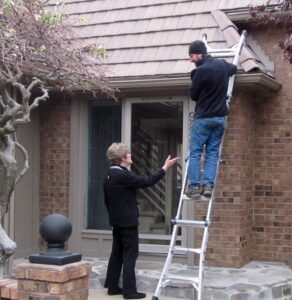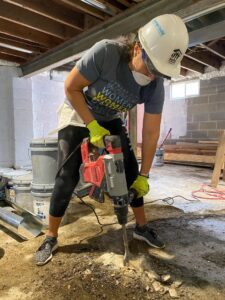Several nonprofits that provide home-improvement services throughout the metropolitan area are laying the groundwork for a system to better coordinate projects for the hundreds of clients seeking assistance.
Operating as the Home Modification Coalition of Greater Kansas City, the group includes nine diverse organizations, including Jewish Family Services of Greater Kansas City, Habitat for Humanity of Kansas City, Church of the Resurrection, Christmas in October, Metro Lutheran Ministry, HopeBUILDERS, Rebuilding Together Kansas City, The Whole Person, and Northland Neighborhoods Inc.
“We are really trying to talk about, and live, and lean into, and believe, that we are better together … and the coalition has been a really great space to bring partners together, knowing that the need is huge,” said Rachel Ohlhausen, program operations manager for Jewish Family Services of Greater Kansas City.
Ohlhausen is co-leading the coalition along with Lindsay Hicks, vice president of development for Habitat for Humanity of Kansas City.

Gutter cleaning is one service offered through the Help@Home program of Jewish Family Services of Greater Kansas City, one of nine area nonprofits that have come together as the Home Modification Coalition of Greater Kansas City.
The coalition members have a combined waiting list of nearly 800 households, with approximately 50 of those clients overlapping between coalition members.
The coalition’s efforts correspond to a need identified in the comprehensive housing study for Johnson County, which United Community Services released in February. Preserving and rehabilitating existing housing, the study said, is one way to retain affordable housing in the county.
Maintenance and repairs are also good ways to help senior citizens “age in place,” allowing them to safely stay in their homes as opposed to incurring the cost and disruption of moving into assisted living.
The origins of the coalition date back a couple years, when United Methodist Church of the Resurrection recognized the need for better coordination among the home-improvement programs it supported financially and through providing volunteers. Church volunteers would sometimes show up at a home and find the work had been completed, since the client had been on more than one waiting list.
The church engaged an urban affairs professor from the University of Missouri-Kansas City to facilitate early discussions about collective impact. Hicks and Ohlhausen stepped up in late 2019 to help the coalition develop further.
With COVID-19 limiting activities last year, coalition members focused on policies and procedures. Strategic planning also identified three front-burner items: seeking collaborative funding, working toward “layering” services, and getting on a shared electronic platform to better share information about client needs.
Better information sharing and collaborative funding are linked, Hicks said.
“We know that if we can bring our data together and better understand the need for funding in this space,” she said, “then we can be better advocates to earn funding.”

A Habitat for Humanity of Kansas City volunteer works on a project for the nonprofit, which partners with families to build or rehab and purchase their own home with an affordable zero-interest mortgage.
Though unsuccessful, a couple of efforts to secure grant funding for the coalition have provided learning opportunities.
Coalition members have agreed on locally-developed case-management software to share client information, and that can facilitate the layering of services, where each coalition partner can bring their expertise to bear for particular clients.
Hicks explained: “Some of these individuals — they might need their gutters cleaned out, great, that is perfect for Jewish Family Services. But they also might need a new roof, and if they need a new roof, then maybe Hope Builders or Habitat is the better fit to do that work.”
The electronic link also allows coalition members to seek out services for an individual client, to see which partner might be best able to meet that particular need.
Even in the early stages of the collaboration, participants have had some successes coordinating services informally.
Said Ohlhausen: “There have definitely been a few emails back and forth for the whole group, saying, ‘Hey, we have this one client, who is the best fit for them?’ or, ‘We have this specific funding, does anyone have a client that fits this description?’”
One potential long-term goal is for the coalition to be a single point of entry for clients seeking home improvements. Ohlhausen said there are also a lot of opportunities for the coalition to coordinate with cities and municipalities.
Even more broadly than that, she said, “We have to get more people interested in building affordable housing, and we have to really think about mixed-income housing, and not stigmatizing low-income housing.
“I think that is a long way off, but I do think there is a really positive outlook for coordinated services between nonprofits.”